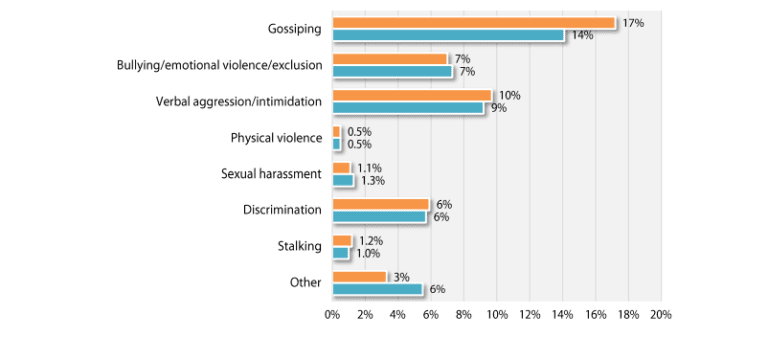The first Social Safety Day at TU Delft was held on 8 October. What is the status of social safety at the university? And what can you do about undesirable behaviour?
This year, TU Delft organised the first social safety day. (Photo: Lucas de Leeuw).
Discrimination, racism, bullying, physical abuse, gossip. Across the country, one in four employees (24%) are affected by undesirable behaviour on the work floor. The figures at TU Delft are no different. In the Employee Monitor 2020, 23% of staff report one or more cases of undesirable behaviour from colleagues, managers or students.
In 2017, that figure at TU Delft was even higher at 28%. That percentage and the workload figures pushed TU Delft to pull out all the stops and do something about it. The faculties and the University Corporate Office made action plans and the Executive Board took action. They:
- ran a training course on social safety;
- recruited a staff ombudsman;
- recruited a prevention officer;
- held ‘open meetings’ on the Rector’s integrity with staff;
- imposed two new directives: the Vision on Integrity and the Code of Conduct.
While socially undesirable behaviour has reduced in totality since 2017, the improvement depends on the subject. So while the Employee Monitor shows fewer reported incidence of gossip, the percentages for bullying, verbal aggression and discrimination remain more or less unchanged.

The figures for 2017 are orange, those for 2020 are blue.
The most striking figures in the 2020 Monitor are the figures on discrimination. The rates are higher at TU Delft than at four other anonymous universities that undertook the same research (in Dutch) in the Netherlands.

This graph shows five universities. Seven universities in total undertook the monitor.
The Monitor does not explain why the percentage at TU Delft is relatively high. Last year, three complaints of discrimination were submitted to TU Delft’s Confidential Advisor. In 2018, there were four.
Confidential Advisors
Not everyone who experiences undesirable behaviour reports it to TU Delft. According to the Monitor, 57% of them reported incidents to a manager, HR staff member, Confidential Advisor, social worker, ombudsman or other person.
The Confidential Advisor listens to complaints, works with the people who lodge complaints and supports them through any follow up. Only a small proportion of staff go down this route. Last year, the Confidential Advisor received 47 reports from students and staff, of which 33 meetings were held. The reports are the tip of the ice-berg, write the Confidential Advisors in their 2019 annual report. In 2018, 68 complaints were received and 35 meetings were held.
External investigation
The faculties have not had their own Confidential Advisors since February of this year. Instead, they refer people to Sandra van der Hor who was appointed by the Executive Board as an external Confidential Advisor.
After the Confidential Advisors disappeared from the faculties, the Executive Board carried out an external investigation. The recommendations that emerged included the appointment of both internal and external Confidential Advisors and the need to improve the organisational structure and facilities around the Confidential Advisors. Once these recommendations have been put in place, TU Delft will start recruiting new Confidential Advisors again.
Employees can also approach the staff ombudsman, Job van Luyken. The ombudsman discussed the issues of 152 employees between March and December 2019, of which eight concerned socially undesirable behaviour. Other issues that have preoccupied Van Luyken include conflicts with managers (27), PhD candidates’ problems (23) and career development (14).
New action plan
In cases of undesirable behaviour, TU Delft has a complaints regulation that stipulates that staff and students may submit complaints to a Complaints Committee that advises the Executive Board. The Executive Board can then take disciplinary action against perpetrators. The percentage of employees that has submitted an official complaint is zero. TU Delft’s annual reports show that last year the Complaints Committee handled four complaints, and in 2018 this figure was three. Between 2014 and 2017, the Complaints Committee even received no complaints at all.
This year TU Delft: published a new Code of Conduct; its employees set up a special Integrity Office; appointed a new Diversity Officer; and is planning to further expand the Diversity Office. One of the jobs of the Integrity Office is to point staff and students who want information or report an incident in the area of integrity in the right direction. The Confidential Advisor that will be recruited will be embedded in the Integrity Office. Apart from these steps, in response to the Employee Monitor, TU Delft will come up with an action plan this year.
- Have you experienced undesirable behaviour? TU Delft’s Confidential Advisor is Sandra ter Hor. Phone her on 06-21170603 or email her at s.vanderhor@tudelft.nl.
- TU Delft also has an ombudsman for staff, Job van Luyken. Phone him on 06-27024134 or email him at J.R.H.M.vanLuyken@tudelft.nl.
- Students can also approach their faculty’s student counsellors.
- The recently established Integrity Office also has a Policy Advisor on social integrity. Keep an eye on the Office’s website for more information.
- TU Delft has university doctors, psychologists for students and staff and social workers who you can approach if you have been affected by abuse or aggression on the work floor.
Do you have a question or comment about this article?
a.m.debruijn@tudelft.nl


Comments are closed.